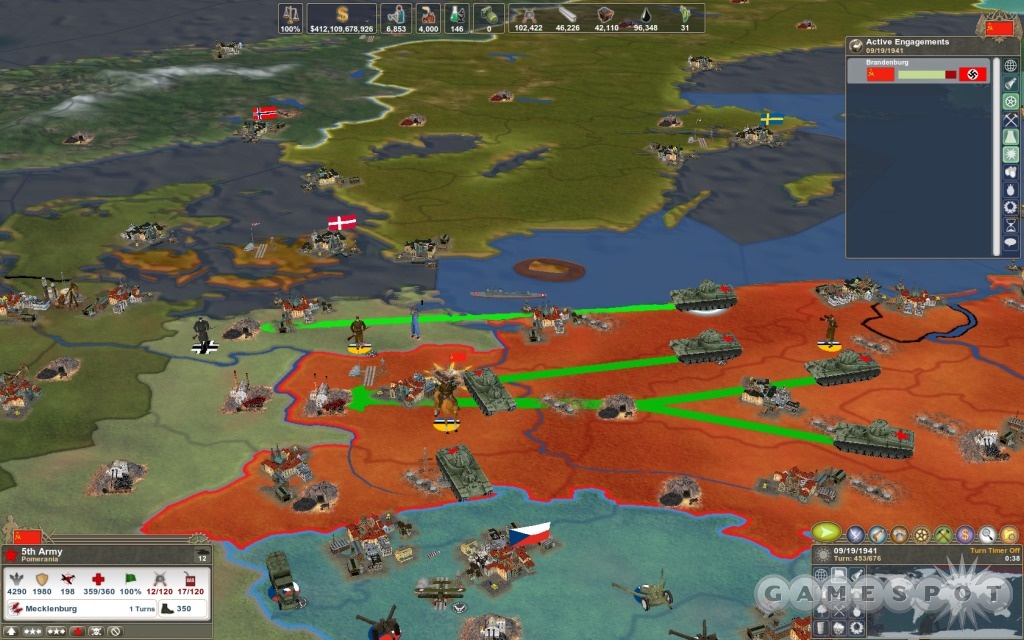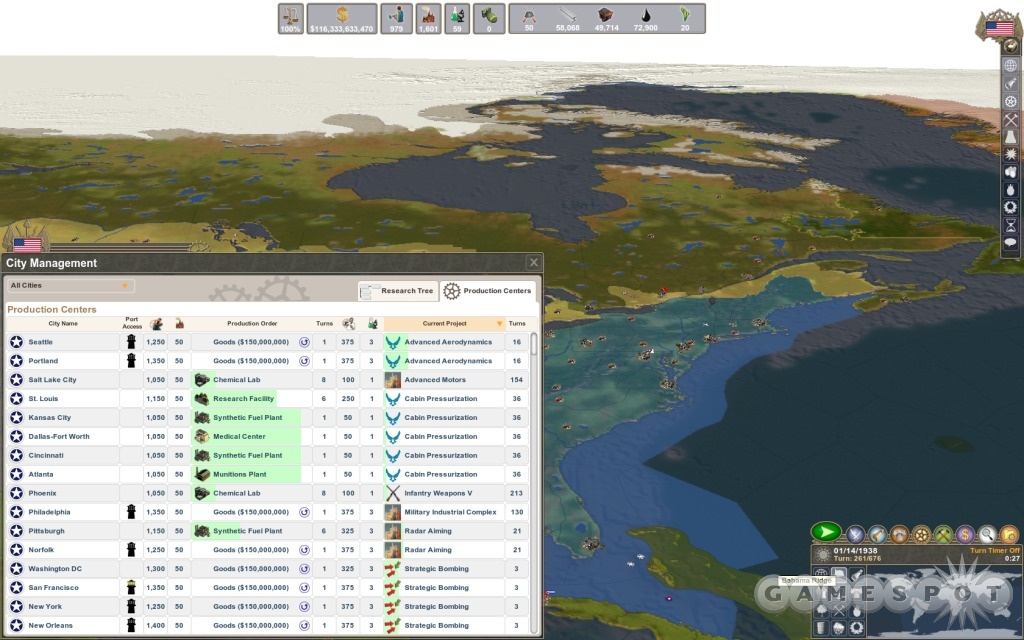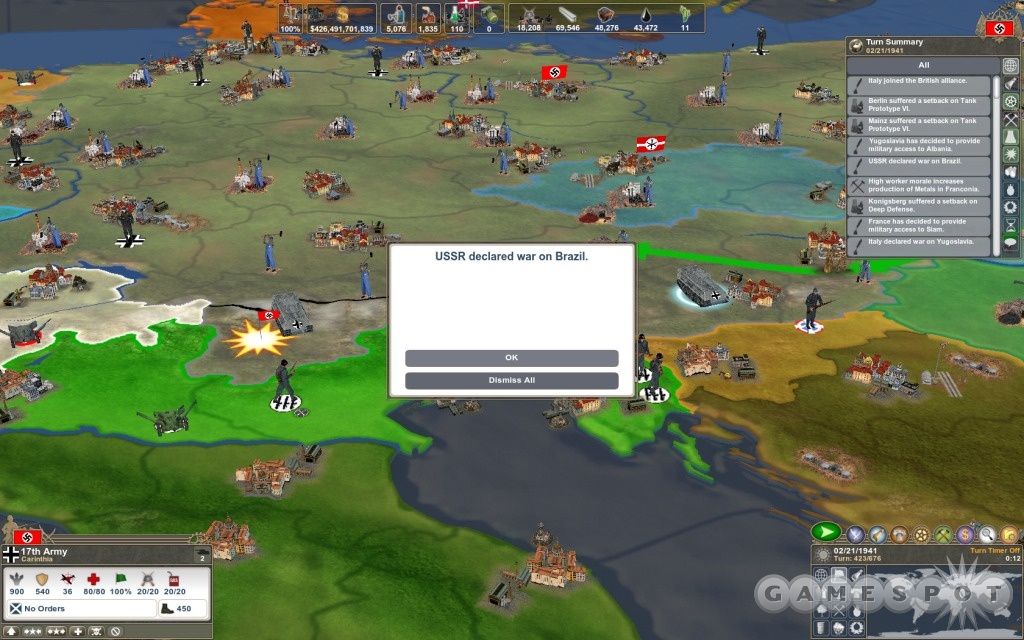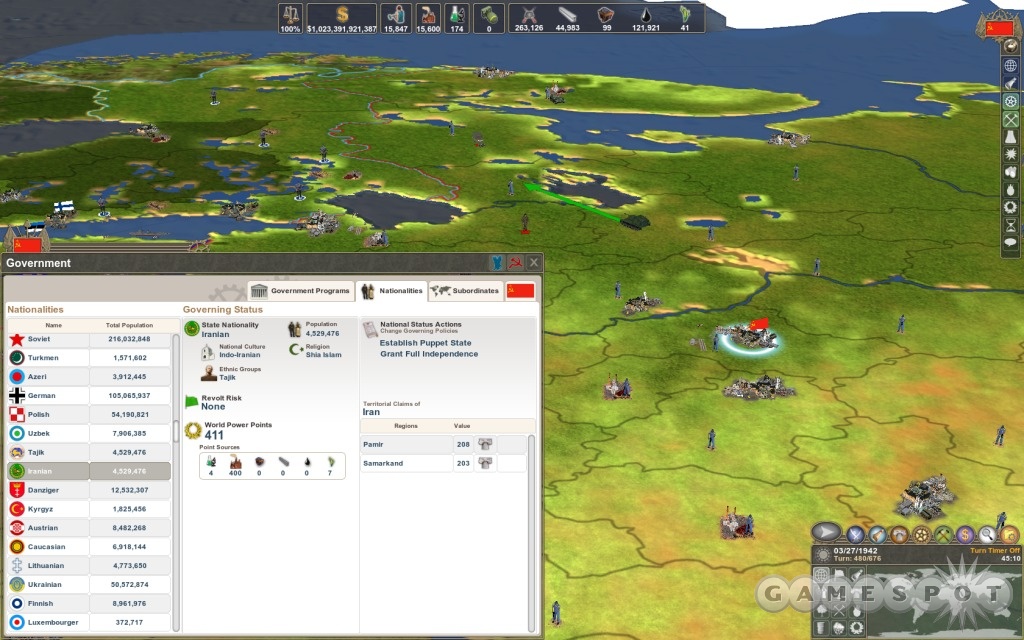There is a time and a place for fanciful alternative histories, but not in a detailed game that limits its scope to one decade of human history, and not when they emerge seemingly at random. Making History II: The War of the World, a turn-based strategy game, tries to simulate the political, economic, and military challenges of the Second World War but instead dumps you into a wacky grand-strategy sandbox where everything seems to go horribly wrong. While its detailed world and involved economics are tempting, they cannot redeem its ludicrous international politics, its dull and unsatisfying combat, or the crashes that permeate the MHII experience.

Grandiose strategy games require a lot of commitment, so be forewarned that Making History II is so bug-ridden you may never be able to complete it. First off, it crashes far too frequently, especially once you get a year or two into the war. It can crash when you order airplanes to attack naval units, when you move carrier task forces out of their ports, when you fill the countryside with collective farms, or just about anytime, regardless of your actions. Even when it's not crashing, a number of strange bugs remain to vex you. One particularly baffling bug pauses the date and resource stockpiles forever. Cut off from the space-time continuum, yet still able to take turns, your armies will mysteriously vanish upon sacking a foreign territory, presumably because they were eaten by the Langoliers. In addition to the bugs, MHII always feels laggy and unresponsive. For example, one moment you might be scrolling through a list of techs to research, and the next you're staring at census information for Qatar, with no earthly clue how you wound up there.
One of the most disappointing divergences between our world and Making History II is the simplistic and unsatisfying combat in this so-called wargame. While in real life you have to consider factors like combined arms, air superiority, weather, and terrain, in MHII these concerns are basically irrelevant. In fact, all you need to win a battle is for your units' combined attack values to be greater than the defenders' combined defense. As a result, fielding a homogeneous horde of super-heavy tanks is preferable to diversifying your forces. Not even the Alps can stop your tank stack of doom, because geography doesn't noticeably affect combat (though it does affect movement speed). Likewise, weather is a nonissue, so General Winter never takes the field. Furthermore, the AI never attempts to contest you for control of the skies, and since your tanks don't require any assistance, there's no compelling reason to use air power, especially since moving aircraft and aircraft carriers around seems to crash the game.

Likewise, the economic side of Making History II, while compelling, is only tenuously tied to the realities of the era. Strangely, coal, which is needed for every unit and building in the game, is more important than oil or metal, a situation more appropriate for the 1840s than the 1940s. For example, in real life the Germans suffered from fuel shortages, but in MHII the Nazis are self-sufficient in oil but always lack coal. The solution to the coal shortage is to place a huge order on the world market during the first turn. You'll wind up deeply in debt, but you can pay that off while other countries beg for coal.
Balancing the needs of industry, research, and the military can be tricky, and you constantly face dilemmas such as whether to focus on improving a city's industrial production or increasing its research output. Since maximizing industrial output, improving the countryside, and investing in science all deplete your finite supply of manpower and resources, you have to make your plans carefully. As a result, it can be immensely satisfying to gaze upon the fruits of your labors, especially when these fruits are industrial metropolises capable of pumping out super-heavy tanks every turn.
Meanwhile, the statesmen of the era have apparently been replaced by kindergartners playing a game of realpolitik, and therefore nothing resembling the international politics of the era will occur in your games. While it is true that the series is called Making History instead of Repeating History, this sandbox would be more appealing if geopolitics were at least remotely reasonable. For instance, the Germans could subsidize Italy for years with generous aid, and Mussolini still wouldn't hesitate to declare war on them for no discernible reason. It's equally likely that Stalin will take advantage of the German-Italian war by invading Brazil. Even when things start to get quasi-historical, the artificial intelligence will do something to make things crazy again. Don't be surprised if you see the Allies respond to a German invasion of Poland by embargoing the Poles and invading China.

The insane politics are surprising in light of the fine attention to historical detail elsewhere in the game. For example, you encounter detailed demographic information for every region, so, thanks to Making History II, you might learn which regions of Bolivia are majority Quechua, Aymara, or mestizo, but unfortunately this information, however illuminating, has no meaningful effect on the gameplay. It could theoretically increase the odds of a provincial uprising, but you never actually see partisans appear, making you wonder what the point is in accurately depicting the territories of, say, the Baluch people when they never fight for a free Baluchistan?
While Making History II's visuals are tolerable, it is as unpleasant to listen to as it is to play. For example, only a handful of musical tracks are included, and these get old really fast, a serious flaw for a game that requires countless hours of dedication. In addition, the sound effects are too loud and overwhelming, bringing to mind the obnoxious whine of a power saw or the whirring hiss of some sort of mechanical cat. On the plus side, the map accurately depicts the world's geography, and many nations have unique-looking units. For instance, German super-heavy tanks look like the Maus, the Russians field T-100s, and the Americans sport T-28s. The units may not be particularly pretty, but at least they look distinct and are historically accurate enough to make you feel like you are playing a game set during WWII, if only for a few fleeting moments before the next crash to desktop.

You'll be even more put off by Making History II's awful multiplayer experience. First off, you're unlikely to find a random Internet game, so you will probably have to arrange one with friends. Once inside the game, you can look forward to each turn shooting by in under five seconds, no matter what time limit you set, as well as frequent crashes. Matches with untimed turns are equally crash-prone, making the multiplayer experience a bust.
In retrospect, the most disappointing thing about Making History II is that it seems like Muzzy Lane put a lot of effort into making all of those unique units and depicting the ethnic makeup of the world as it was 70 years ago. Unfortunately, the game is plagued by performance issues, uninspiring combat, and an insane depiction of international relations. On the bright side, numerous updates for the game have been released in the past few weeks that have improved performance and crushed numerous bugs, so Making History II might one day be a functional game. As it currently stands, however, it's not worth either your time or your money.